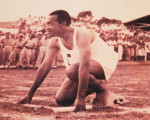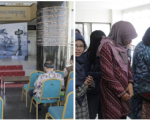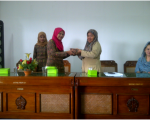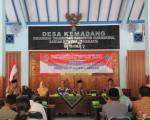Questioning the Role of Libraries in the Internet Age
Writer:
Hendrikus Franz Josef, M.Si
Regional Library and Archive Office of
2019
Abstract
The development of information and communication technology has made a transfer of knowledge easier. This makes the younger generation begin to leave physical books and start switching to e-books that can be accessed anywhere online. Therefore, in this digital age, the function of libraries as providers of information and knowledge services must change. The library must change its paradigm to be based on information technology and further develop itself, so that as a source of library learning it remains the backbone of the nation in gaining knowledge and deepening knowledge. Libraries must remain one of the important pillars of education in universities and the general public. Therefore, the public should pay important attention to the management and development of libraries, both in terms of the availability of books, access to international scientific journals, application of information technology and reliable human resource librarians. The way to get this nation out of ignorance is the library. The librarian's challenge now is whether he can stand up and tell library users that their needs can be found in the library. The quality of libraries must have an important role in supporting the advancement of science by providing relevant references to support research needs. At present research publications in
Preface
The library has a role as an information institution that seeks to meet the information needs of users through the collection it serves. This is in line with several library functions as treasures for storing human works and information sources that aim to find, manage and serve information to all library stakeholders. Information is a vital aspect of 21st century society because the industrial era is turning into an information society. Where the tendency to use information in a relatively short and long time occurs at any time in individuals or groups.
Individual/group characteristics are an important aspect that must be considered by libraries as library users in using information. Their information needs are varied, on mood and unique so that they are not only based on subjects or study programs, individual/group library users have hobbies that need to be supported by library information sources. The impact is on the library collection that is demanded to always manage and serve the collection as well as possible by the library to users. A practical example is to survey information needs which are then realized, adding to the wealth of fiction collections and optimizing electronic journal services.
The answer is to get the community to be able to do learning independently. As an example, people can already read and are obliged to get used to and take the time to read. Because reading is an independent learning process. The spoken information will be processed by the brain as a stimulus which is then stored in memory for consideration. Next is the interest and culture of reading which is the forerunner to the birth of a lifelong learning community. To make people interested and cultured reading is not easy and short. Mainly when it has been labeled culture, a case that we know of one's own culture is something that is trusted, guarded and hereditary. Likewise, with the culture of reading, when it is becoming something that is trusted and dropped by the community, it will always be done by the community at all times under any circumstances (for life). Because people understand that the reading culture that they believe has an impact on their life patterns. Thus, the community goes to lifelong learning society through reading cultural activities.
The next concept is reading interest which is categorized as the basis in shaping reading culture. Of course culture comes from the similarity of an individual or group in a relatively long amount and time. When the interest in reading a particular country or group is already high, a reading culture is formed because it is becoming a habit of certain groups continuously or in high numbers.
From these three aspects it can be concluded that lifelong learning is the impact of high public interest and reading culture. Because by reading the community directly doing independent learning activities. The role of libraries as facilitators to build a lifelong learning generation is by organizing programs that are able to increase the interest and reading culture of the users. The task of the library with its collection is able to invite users to explore the information they need. Examples of speed reading programs, summarizing readings, making articles as procuring local content and story telling (for elementary school libraries). The activity is part of the library's efforts to increase interest and shape the culture of the community so that the formation of lifelong learning. Moreover, the library as an institution that is always open to users so that whenever a user can use their collection more freely
Library is Still Needed in the Internet Age
The library is said to be the developer of library user communication with other users or between institutions, this is closely related to the basic concept of communication. Where good communication produces reciprocity between the communicant and the communicator. The case in the library there is no specific limit between who is communicant or communicator, both can be positioned by library and library users. The emergence of communication reflects the individual's need for something he wants to achieve. Likewise with library users who have different characteristics in finding information will form communication patterns within the scope of the library. An example is when library users have difficulty using the electronic journal portal provided by the library tends to communicate with other library users in the vicinity. Reciprocity between the two library users will lead to a good and sustainable relationship such as forming research projects in groups, communities and personal needs.
Furthermore, the library in addition to developing fellow library users, is with other institutions as library stakeholders, namely schools for school libraries and universities for college libraries. Collaborative or communication activities that are libraries with institutions are usually more formal. Because of its formal nature, the development of communication is usually a form of long-term investment in libraries. The purpose of this collaboration is to maintain the existence and image of the library for the better. Examples are libraries providing local content services, library user guidance programs and reading interest habituation programs.
The role of libraries as motivators, mediators and facilitators for library users in finding, utilizing and developing knowledge and experience is done through professionalism, research grant programs, verbal-nonverbal communication and wealth collection. In this way library users will be encouraged to participate actively in these activities because the librarians who always provide excellent service will affect the integration of library users to the library. When library users need good information for assignments, research or hobbies will come to the library because it has become an integral part of the library.
The research program is one way to develop the ability of library users to process the information obtained. Libraries that run the program can provide flexibility to library users to use their collections to support the research conducted. Verbal-verbal communication, the main thing that makes someone want to find, use and develop collections in the library is a good communication between the library and library users. Clarity of the role, tasks and functions of the library will provide an understanding to the library user to the existence of the library itself. Library user guidance is a must for any type of library. With the guidance of library users, the library explains specifically about the services it has as an asset that is ideally enjoyed by the library user as a whole. Specifically service points such as research results, journals and references that support the research preparation process. Because with this research, library users will search, discover and develop their knowledge in the library.
Agent of change, or also known as development agent, cultural agent. It means that the library is a place of reference and source of information. For people who need it and the development carried out is to achieve things that are more and better, and all of that is a form, and a tangible manifestation of a nation's culture and humanity in general. This means that the changes that occur in community life include starting from the library, mainly carried out by scientists and researchers by developing new inspiration, creations, and innovations. It is based on the thought that something that changes basically begins with the discovery and development of science.
Referring to the opinion expressed by the figure, there is an emphasis on the concept of the development of science. These changes certainly have an impact on the needs of library users of the information needed. So the library must innovate in managing information that will be served to library users. This is an effort to maintain the existence of the library as a reliable source of information because of the quality and quantity of its collections in the midst of the widespread internet era in all fields. Examples of library activities in the face of the expansion of the internet in all fields are by updating the latest collections of both the latest and revised editions, digital collections and service innovations and developing library manager competencies.
So, information technology-based library services must be expanded immediately, librarians have a new role in the internet age. For libraries that have implemented digital libraries, advances in information technology have encouraged librarians to improve their capabilities in the field of information technology so that they can meet the demands of library users and the role of librarians will be more complex.
Library activities such as selection, procurement of books and journals that traditionally still have to be carried out by librarians who work in the procurement department, but the task must now be increased by selecting available digital collections or digital library materials, both free and which must be related. If we hold collections digitally, for example digital journals, the librarians of the selection section must choose which journals are suitable and in accordance with the needs of library users.
Librarians in the processing of library materials must also be able to change their role from being originally only processing books, now they have to learn about how to process CD-ROM collections, Audio-visual collections and other digital collections. Users' needs about catalogs are not enough just to be provided through OPAC, they expect more than what is usually done by librarians. They hope not only to see the bibliography of data. They want to be able to see information in the form of abstracts even to "full-text."
Librarians who work in services such as reference services, the internet, and digital collections also face demands from library users to adjust them. They still have to do routine work as usual, but they must also be able to meet the demand of library users via the internet. Users often need special services, requests for information via e-mail, WhatsApp and other social media. All of these require special expertise to fulfill them.
In short it can be said that the library is being confronted with the fact that the demands of library users for information have been extraordinary including information in digital form. But libraries still experience many obstacles such as limited funds and the slow change of the bureaucratic system. For this reason, the best way to overcome this problem is by: first utilizing and developing the existing librarians optimally to follow the development of information technology; secondly the addition of new staff through strict selection and library education criteria and also having information technology knowledge; third, encouraging library leaders to study information technology and also be willing to apply it in libraries and change management.
Senior librarians are the main capital of libraries in guarding change. Most libraries have difficulties in recruiting new workers, therefore it is a fundamental thing if the library leaders involve senior librarians in planning activities to be held by the library including activities related to the use of information technology. They must be motivated to follow the development of information technology. If there are one or two senior librarians who are late in mastering information technology, they must be included so that they can set an example for junior librarians. Younger people should be more active in learning compared to older ones.
Even though the addition of new workers is now difficult, but it does not rule out the possibility to do so. The most important thing in recruitment is that it should be done should be possible. Librarian criteria to be accepted must be clear, avoid collusion and nepotism and selection must be done professionally and transparently. Librarians needed to face the challenges ahead are besides librarians who have a library education background, they must also be capable and experts in the field of information technology.
The structure of the organization which was originally effective for the achievement of objectives, may now need an evaluation. Is the existing structure still effective and in accordance with the demands of technological development ?. Changes must be made so that library goals can be achieved effectively and also in accordance with progress.
Leadership style is another element that can influence the success of libraries in facing challenges in the future. The traditional leadership style will face many obstacles when applied today, where changes occur so fast, the demands of library users are so high that it is beyond the capabilities of librarians. Therefore, we must leave the traditional leadership style replaced with a more flexible leadership style in dealing with changing times.
Conclusion
Advances in information technology have influenced the role of librarians in carrying out their duties. There are librarians who are happy with the change and there are librarians who do not want to enter the change. But what is clear, librarians happy or not, who benefit from advances in information technology are library users. For librarians who do not follow the development of information technology, they will also be out of date, and they will automatically be eliminated. For librarians who keep abreast of progress, they are the hope and future of the library. They will be able to manage the library according to user demands. Library leaders must keep motivating them, both those who are happy and those who are not. Because they are the main capital of the library in facing the era of digitizing information.
The library in the future is a library that can meet all information needs from all walks of life with different educational backgrounds, ages, occupations, races, genders, and interests. Retrieval of information and dissemination of knowledge through libraries will only take a very short time, and no library says it does not have certain information, just because the source of information is not in the library. The concept of a library will change from a local library to a global library.
Realizing this concept, libraries are required to network or collaborate between libraries that are committed and ongoing. Libraries will compete to build as many networks with similar libraries or other libraries outside the environment or comfort zone. There is no longer any thought that library collections can only be used by members of the library. Library network allows for each library member to access other library collections that have been networked. No additional cards are needed to borrow other library collections, because with the library network allowing one card is valid for many libraries.
More great than that, library users who will use the library do not need to search inside the library, they can do it anywhere by using internet access. Without waiting long, the desired collection can be easily ordered and delivered according to the wishes of library users.
Creating a "global library" must be accompanied by the sincerity of each library to give each other library access to its partners. All that can be realized by first making a uniform system that is used. The system used in the future must allow libraries to share data and metadata without having to physically move collections. The catalog must be web-based and mutually integrated, libraries that insist on their principles and ideals not to provide access to other libraries to be able to use, will eventually be abandoned by library users and will become extinct.
Bibliography
Bertot, John Carlo, Paul T., Jaeger, and Charles R. McClure. Public Libraries and the Internet: Roles, Perspectives, and Implications. ABC-CLIO, 2011;
Nicholas, David., Assessing Information Needs: Tools, Techniques and Concepts for the Internet Age. Routledge, 2003;
Melchionda, Maria Grazia, Librarians in the age of the internet: their attitudes and roles: A literature review, New Library World 108.3-4, 2007;
Sutarno, Manajemen Perpustakaan: Suatu Pendekatan Praktik, Sagung Seto, Jakarta, 2006;
Wooden, Ruth A., The future of Public Libraries in an Internet Age, National Civic Review 95.4, 2006;
Zickuhr, Kathryn, Lee Rainie, and Kristen Purcell, Library Services in the Digital Age, Pew Internet & American Life Project, 2013.
Perpustakaan Lainnya
 Sri Sultan Hamengku Buwono IX Sebagai Atlet Dalam Kejuaraan Lari Estafet Pada kejuaraan PASI Tahun 1956
Sri Sultan Hamengku Buwono IX Sebagai Atlet Dalam Kejuaraan Lari Estafet Pada kejuaraan PASI Tahun 1956
Sri Sultan HB IXdulunya adalah salah satu atlet handal dari Yogyakarta. Dalam salah satukoleksi foto pada Ekspose Perpustakaan dan...
 “PUSTAKA ISTIMEWA” Pameran Buku di Grhatama Pustaka
“PUSTAKA ISTIMEWA” Pameran Buku di Grhatama Pustaka
Dalam rangka hari bukunasional, BPAD DIY mengadakan pameran buku dengan tema “Pustaka Istimewa”. Pameranini merupakan agenda...
 Pemberian Kenang-kenagan oleh SMK Nurul Ilmi Tasikmalaya kepada BPAD DIY
Pemberian Kenang-kenagan oleh SMK Nurul Ilmi Tasikmalaya kepada BPAD DIY
Rabu (20-01-2016), Penyerahan Kenang-kenangan yang diberikan oleh Ibu Ikeu perwakilan dari SMK Nurul Ilmu Tasikmalaya dan diterima...
 Bedah Buku : Kebijakan Pembangunan Destinasi Pariwisata Konsep dan Aplikasinya di Indonesia di Balai Desa Kemadang, Gunungkidul
Bedah Buku : Kebijakan Pembangunan Destinasi Pariwisata Konsep dan Aplikasinya di Indonesia di Balai Desa Kemadang, Gunungkidul
Dinas Perpustakaan dan Arsip Daerah (DPAD) DIY menggelar bedah buku mengenai konsep pengelolaan destinasi pariwisata di Balai Desa...

 Penyerahan Buku KCKR dari Lintang Pustaka Utama
Penyerahan Buku KCKR dari Lintang Pustaka Utama